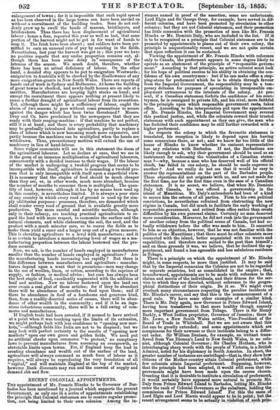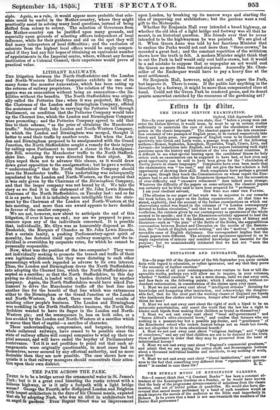RECENT COLONIAL APPOINTMENTS.
Pm appointment of Mr. Francis 'Nicks to be Governor of Bar- bados has been mentioned by a journal which supports the present Government, as only one in a series of appointments establishing the principle that Colonial statesmen are to receive regular promo- tion, _not being limited to their own colonies. Among the in- stances named in proof of the assertion, some are unfortunate. Lord Elgin and Sir George Grey, for example, have served in dif-
ferent •colonies, and have been promoted by circulation to other colonies; but they are not Colonial statesmen, and their promotion has little connexion with the promotion of men like Mr. Francis Hincks or Mr. Dominic Daly, who are included in the list. If it is to be recognized as a principle that Colonial statesmen are to be promoted by appointments to places out of their own colony, the principle is unquestionably recent, and we are not quite certain that upon reflection it can be sustained.
Viewing the appointment of Mr. Francis Hineka with reference only to Canada, the preferment appears in some degree likely to operate as an abatement of the principle of "responsible govern.; ment." According to that principle, an active colonist must look for his hope of political success to his ability in obtaining the con-
fidence of his own countrymen : but if he can make office a step- ping-stone for preferment which he is to obtain through favour from the Imperial Government, the responsibility may be a tem-
porary delusion for purposes of speculating in irresponsible em- ployment extraneous to the interests of the colony. At pre- sent, if a Canadian statesman forfeits the confidence of his coun- trymen, he is consigned to private life, and his rival, more faithful to the principle upon which responsible government rests, takes office. According to the interpretation put upon the appointment of Mr. Francis Hincks, the Imperial Government may reverse this poetical justice, and, while the colonists reward their trusted statesman with such appointment as they can give, the man who has forfeited their confidence may be still further rewarded with a higher preferment. As respects the colony to which the favourite statesman is translated, his reception is likely to depend upon his having some connexions there, or not ; and we know far too little of the house of Hincks to know whether its eminent representative has any relations with Barbados. If not, the Barbadians are likely enough to ask, why their government should be used as an instrument for redressing the vicissitudes of a Canadian states- man P—why, because a man who has deserved well of his official chiefs, has failed in one colony, he should be made supreme in another ? And we really do not see that it would be easy to answer the representations on the part of the Barbados people. These objections did not originate with us, and are not made for the first time, nor for the first time even in the ease of a Canadian statesman. It is no secret, we believe, that when Mr. Dominic Daly left Canada, he was offered a governorship in the island of Mauritius. Mr. Daly's antecedents had been of a kind to secure him the esteem of all parties. Firm to his own political convictions, he nevertheless refrained from obstructing the new regime in Canada, but did much to facilitate the early working of responsible government, and retired from office rather than create difficulties by his own personal claims. Certainly no man deserved more consideration. Moreover, he did not rush into the government of another colony from the political arena of Canada, but had ac- tually withdrawn before the offer was made to him. It occurred. to him as an objection, however, that he was not familiar with the politics of the Mauritians ; that there must be other colonists more connected with the island, better acquainted with its wants and capabilities, and therefore more suited to the post than himself ; and on these grounds it was, we believe, that he declined the ap- pointment, and found a less agreeable and less salubrious residence in Tobago. There is a principle on which the appointment of Mr. Hincks might, in some respects, be more than justified. It may be said that by the Imperial connexion the Colonies are not to be regarded
as separate countries, but as consolidated in the empire ; that, henceforward, appointments are to be made with reference to the
claims and merits of the individuals, and their fitness for the ser-
vice to which they are directed, -without reference to the geogra- phical distinctions of their origin. Be it so. We might even
overlook many circumstances respecting the peculiar incidents of Mr. Hincks's career, and say that this is the commencement of a good rule. We have some other examples of a similar kind.
There is Mr. Daly again, now Governor in Prince Edward Island, having been transferred to that more healthy though scarcely more important government from Tobago. There is Sir Henry Barkly, a West Indian proprietor, Governor of Jamaica; there is Mr. Lowe, a New South Wales settler, Vice-President of the Board of Trade in Whitehall. But we are not aware that this list can be greatly extended; and some appointments which are conspicuous for their newness or their incidents belong to a differ- ent order. Sir William Denison, for example, an irritant trans- ferred from Van Diemen's Land to New South Wales, is no colo- nist, although Colonial Governor ; Sir Charles Hotham, who is interchanging sharp words with the people of Victoria, is a British Admiral, noted for his diplomacy in South America. In short, the greater /lumber of instances are centrifugal—that is, they show how citizens of the Mother-country attain Colonial preferment, while few colonists attain Imperial preferment. Supposing, however, that the principle had been adopted, it would still seem that im- provements might have been made upon the course chosen. Granting that it is desirable to institute a circulation of preferment, it would certainly have appeared more natural to promote Mr. Daly from Prince Edward Island to Barbados, letting Mr. Hincks enter the rank of Colonial Governors as the subaltern, holding the commission for Prince Edward Island! For this the oases of Lord Elgin and Lord Harris would appear to be in point ; but the recent arrangement seems to be actually in violation of such prin-
ciple. Again, as a rule, it would appear more probable that colo- nists could be useful in the Mother-country, where they might practically assist in solving many local questions, instead of being shifted from colony to colony. The selection of Governors from the Mother-country can be justified upon many grounds, and especially upon grounds of selecting officers independent of local influence, while for their guidance and aid on the spot they will find many interpreters of local difficulties ; and the exclusion of colonists from the highest local offices would be amply compen- sated if they had any fair hopes of Obtaining an equivalent number of appointments in the Imperial centre, where, without any formal institution of a Colonial Council, their experience would prove of practical value.



























 Previous page
Previous page